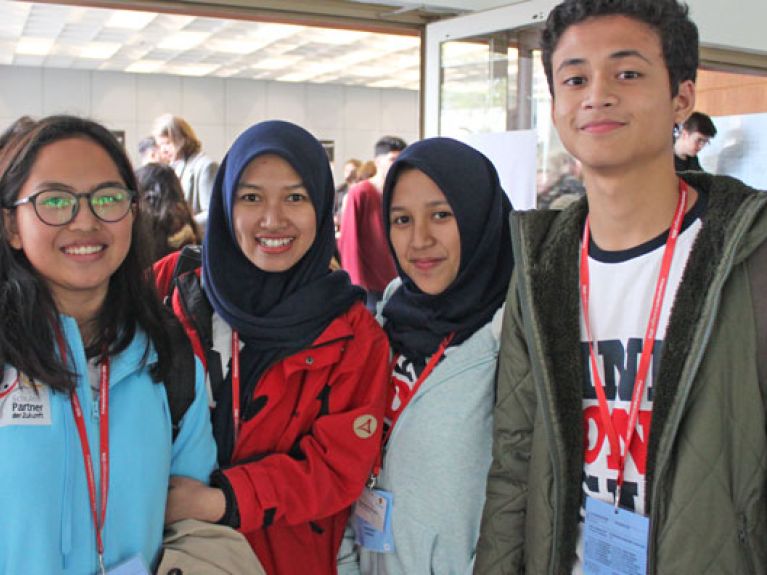The power of community
They come from Kenya, Mexico, and Egypt: More than 300 pupils, teachers, and alumni from all over the world are meeting at the “Moving People” forum, where they discuss education, Germany, and the German language.

“Hold on for a moment, please, I’m just in the middle of Tuscany.” Radiant fields of yellow sunflowers, picturesque country houses, green hills and valleys – Pascal Omar raves about the famous region in Italy. Then the 17-year-old Egyptian takes his goggles off – and seems a bit disappointed. Gone is the fascinating countryside. He’s back in the middle of the “Station”, an events venue at Berlin’s Gleisdreieck. Using the homemade goggles he immersed himself for a brief spell in Italy. Pascal Omar is taking part in a workshop run by Bielefeld University’s “Teutolab”. Together with other students he’s learning why people can see in three dimensions and how simple it is to create a virtual reality.
The workshop is one of more than 20 that are on offer on the third and last day of the major education forum “Moving People – Forum on cultural relations and education policy” organized by the German Federal Foreign Office from 13-15 April 2016 in Berlin. More than 300 pupils, teachers and school heads from over 50 PASCH schools in 30-plus different countries were invited to Berlin. Where they discussed Germany, the German language, education and culture. And that Friday they were experiencing “culture and foreign policy live” and finding out what foreign policy means in practice.
What they all have in common is their enthusiasm for German and Germany. “We are living in a globalised era, and language means immersing oneself in a new culture,” Minister of State Maria Böhmer said at the beginning of the forum. Worldwide there are more than 15 million people learning German. “They are the best ambassadors I can imagine.”
Knowledge promotes tolerance and respect
The pupils, teachers, and alumni are spending three days together: On the opening evening they listen eagerly to two discussions about education, and meet young people from all over the world, who talk about why they are learning German. “I like a challenge,” Bhavika, a 16-year old young woman from India, for example, says. Her dream is to study Mechanical Engineering in Germany and – for a while at least – settle there.
On the second event day there are more than 20 workshops for the youngsters at “Waldgymnasium” grammar school in Berlin, one of which is “Cooking around the World”. Couscous, parsley, mint, cucumbers, spring onions, tomatoes, one drop each of lemon juice and olive oil, a pinch of salt, a little pepper: These are the most important ingredients in a tabbouleh, a traditional Arab dish. “How much pepper do we need, Rama? And how small should we chop the cucumbers?” asks 17-year old Silvia from Munich. Rama knows the exact amounts; for her, tabbouleh is more than just a salad. For the 16-year old girl from Syria the dish is a strong reminder of home. Nine months ago she fled from Syria to Germany, and for five months she has been learning German at “Waldgymnasium” grammar school in Berlin’s Charlottenburg district. This Thursday she is the one teaching other schoolchildren: how people cook in her home country, and what they like to eat.
The topics of the workshops are as diverse as the cultures from which the schoolkids come. From acting, drawing comics, rapping, robotics, wheelchair basketball, and physics, to photography, poetry slams – and cooking: The students strike up conversations with one another about numerous topics. “Cooking is fun and you get to know people well,” says 17-year old Anna from Munich.
Jamileh is also curious to find out about foreign cultures. The 16-year-old girl from the Palestinian territories is taking part in the workshop on “Traditions and Cultural Dialogue” run by the UNESCO project schools. Along with other students she is discovering all about social, cultural and religious traditions. What traditions prevent intercultural dialogue and which should also be preserved for the future? How to live together in a spirit of tolerance? The participants together try to find answers. Is there something that Jamileh would consider typically German? She smiles. “Yes, people are so punctual. But thankfully that certainly doesn’t get in the way of dialogue.”
In a “Long Night of Ideas” not only school students, but also Berliners with an interest in the topic enjoyed discovering why the cultural affairs and education policy is the third pillar of Germany’s foreign policy – in discussions, guided tours of museums, films, and performances: Culture can break down barriers dividing people. Culture and dialogue is happening at 15 different locations in Berlin.
To abandon established ideas and make space for new ones is also the theme at the “Silent Green” cultural quarter, where SAVVY Contemporary invited everyone to attend performances, lectures and artistic interventions right through to 6 a.m. “Abandoning your own privileges is an important step here as it denotes the beginning of an ethical relationship to the Other,” is the underlying idea driving the event. Using washtubs, ironing boards and white paint, an artist presents the proverbial money laundering – she first washes the dollar bills before hanging them up to dry. Another artist uses lipstick rather than pigment to paint the outlines of a landscape on white walls.
This evening, the Maxim Gorki Theatre has opened its doors for a discussion with visitors on the task of culture and theatre in an age of social change. To this end, the theatre is presenting the play “Common Ground” by its director, Israeli Yael Ronen. Head dramaturg Ludwig Haugk believes that one of the key tasks of the Gorki Theatre is to kindle discussion on precisely bones of contention by placing such topics firmly on the stage. “After all, we are an artistic venue and reflect society,” Haugk continues.
On the final day, the closing speech by Federal Foreign Minister Frank-Walter Steinmeier also focusses on what makes us us, what is foreign, and the social power of education. “We engage with partners all over the world to convince them to show a willingness to view the foreign not as a threat, to be open for interaction and to create opportunities precisely for that,” Steinmeier says. He then goes on to talk about the coach of the Lebanese national girl’s football team, Hiba Jaafil. With her at the helm the team won the first international football title in its history, the Arab Women’s Cup. Only then were the initially sceptical parents convinced that their daughters were doing the right thing. “Strengthening the social power of culture and education is the best path into a more peaceful world,” Steinmeier states. And to find examples of this approach, the Federal Foreign Minister only needs to cast a glance across the “Station”, filled with several hundred students and teachers: “It is people like Syrian scholarship holder Alaa, Russian student Ilya, Lebanese football coach Hiba Jaafil and countless others here today,” Steinmeier insists. “They are all people who are moving something. And are moving us.”

